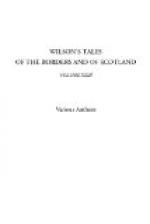Yet, unfortunately for the far-seeing and provident father, this scheme threatened to fructify sooner than he wished, if indeed it could ever have fructified to his satisfaction; for the grisly spectre of typhus laid his relentless hand upon Mary when she—and of a consequence Annie—was somewhere about eight years old. And surely, being as we are very hopeful optimists in the cause of human nature, we need not say that the father, as he and his wife watched the suffering invalid on through the weary days and nights of the progress towards the crisis of that dangerous ailment, never once thought of the Pelican, except as a bird that feeds its young with the warm blood of its breast. But, sorrowful as they were, their grief was nothing in comparison with the distress of little Annie, who slipped about listening and making all manner of anxious inquiries about her sick sister, whom she was prohibited from seeing for fear of her being touched by the said spectre; nor was her heart the less troubled with fears for her life, that all things seemed so quiet and mysterious about the house—the doctor coming and going, and the father and mother whispering to each other, but never to her, and their faces so sad-like and mournful, in place of being, as was their wont, so cheerful and happy.
And surely all this solicitude on the part of Annie Maconie need not excite our wonder, when we consider that, from the time of their birth, the twin sisters had never been separated, but that, from the moment they had made their entrance on this world’s stage, they had been always each where the other was, and had run each where the other ran, wished each what the other wished, and wept and laughed each when the other wept or laughed. Nature indeed, before it came into her fickle head to make two of them, had in all probability intended these little sisters—“little cherries on one stalk”—to be but one; and they could only be said not to be one, because of their bodies being two—a circumstance of no great importance, for, in spite of the duality of body, the spirit that animated them was a unity, and as we know from an old philosopher called Plato, the spirit is really the human creature, the flesh and bones constituting the body being nothing more than a mere husk intended at the end to feed worms. And then the mother helped this sameness by dressing them so like each other, as if she wanted to make a Comedy of Errors out of the two little female Dromios.
But in the middle of this mystery and solicitude, it happened that Annie was to get some light; for, at breakfast one morning—not yet that of the expected crisis—when her father and mother were talking earnestly in an undertone to each other, all unaware that the child, as she was moving about, was watching their words and looks, much as an older victim of credulity may be supposed to hang on the cabbalistic movements and incantations of a sibyl, the attentive little listener eagerly drank in every word of the following conversation:—




